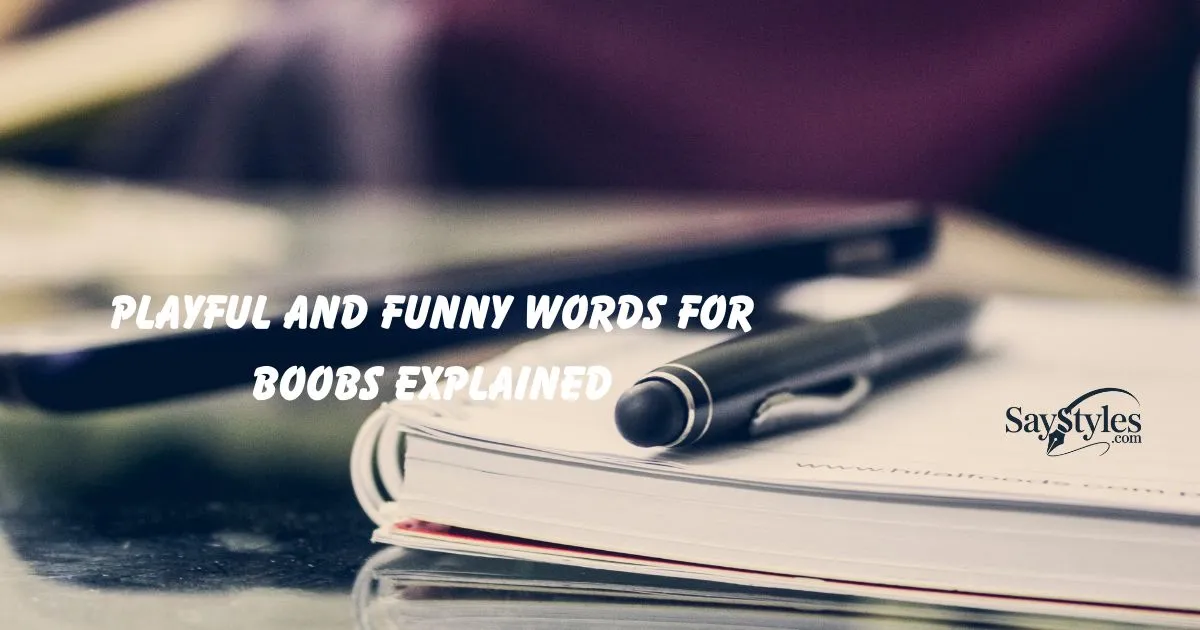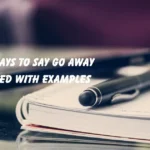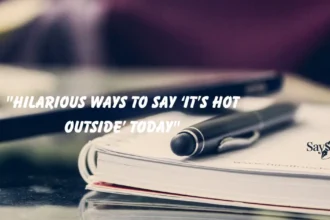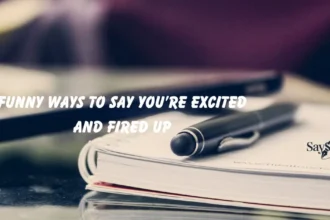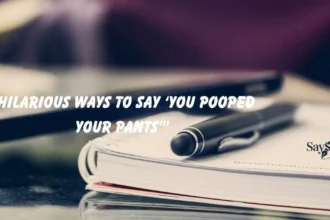“They say laughter makes everything better even when talking about boobs!”
Hi, I’m here to keep things light, funny, and a little cheeky as we dive into the world of playful and funny words for boobs. People use all kinds of silly names to make jokes or add humor to conversations from classics everyone knows to creative ones you might hear for the first time. It’s all about having fun with language while keeping it friendly and lighthearted.
In this article, we’ll explore the most popular, playful, and hilarious words for boobs, explain what they mean, where they come from, and how people use them in everyday talk. So get ready to laugh, learn, and enjoy this funny side of English slang!
Lighthearted Ways to Talk About Boobs
Story:
Emma and Jake were watching a comedy movie when a funny scene came up. Emma laughed and said, “Some people just know how to make even awkward topics sound funny.” Jake grinned and added, “It’s all about keeping it light, right?”
When to Use:
Use lighthearted terms when joking with close friends or your partner who shares your humor.
When Not to Use:
Avoid these in formal settings or around people who may find such jokes uncomfortable.
Example:
Emma: “Jake, your jokes are always so cheerful— even when you talk about boobs.”
Jake: “I aim for fun, not shock.”
How to Respond 🗣️
Smile or reply with a playful comment like, “At least you keep things fun!”
Classic Slang Terms Everyone Knows
Story:
Lucas and Mia were chatting about old-school slang. Mia giggled, “My grandpa once used the word ‘knockers’ and I couldn’t stop laughing!” Lucas replied, “That’s one of those timeless ones everyone’s heard.”
When to Use:
Perfect for nostalgic or playful conversations when everyone’s comfortable with light jokes.
When Not to Use:
Skip these words in mixed company or around people you don’t know well.
Example:
Mia: “Do people still say ‘knockers’?”
Lucas: “Only if they’re stuck in the ’80s!”
How to Respond 🗣️
Laugh and say something like, “Classic never goes out of style.”
Funny and Creative Nicknames Explained
Story:
Sophie and Ryan were brainstorming silly nicknames for a comedy skit. Sophie said, “We can’t just say the usual stuff. Let’s make something fun like ‘giggle pillows.’” Ryan burst out laughing, “That’s gold!”
When to Use:
Use creative names when joking with friends or writing something meant to be humorous and harmless.
When Not to Use:
Avoid them when someone may misinterpret it as offensive or too personal.
Example:
Sophie: “What about ‘giggle pillows’ for our skit?”
Ryan: “That’s ridiculous— I love it!”
How to Respond 🗣️
Laugh or add your own fun twist like, “That one deserves an award.”
Pop-Culture Words for Boobs
Story:
Liam and Chloe were scrolling through memes. Chloe noticed how shows use funny code words for boobs and said, “Pop culture really shapes slang.” Liam nodded, “Yeah, half of these started on TV.”
When to Use:
Use these when referencing movies, shows, or memes in a casual chat.
When Not to Use:
Avoid them in professional talks or with someone unfamiliar with the pop-culture reference.
Example:
Chloe: “That show used ‘coconuts’ again!”
Liam: “It’s their favorite running joke.”
How to Respond 🗣️
React with interest, like, “I’ve heard that one in a few shows too.”
Witty and Pun-Based Names for Boobs
Story:
Noah and Lily were at a comedy open mic. Noah whispered, “That comedian’s puns are wild.” Lily laughed, “Who knew you could make clever wordplay about everything, even boobs?”
When to Use:
Use witty puns when writing or joking creatively with people who enjoy wordplay.
When Not to Use:
Don’t use them if someone seems uncomfortable or if the setting feels inappropriate.
Example:
Lily: “Those jokes were busting with humor!”
Noah: “That’s one way to lift the mood.”
How to Respond 🗣️
Laugh lightly or reply with another pun like, “You really nailed that one.”
Silly Yet Harmless Boob Nicknames
Story:
Ava and Daniel were goofing around while watching a stand-up show. Ava said, “Some nicknames sound so silly they could never offend anyone.” Daniel laughed, “Exactly, harmless fun is the best kind.”
When to Use:
Use these when joking with friends or in lighthearted banter where everyone knows it’s all in fun.
When Not to Use:
Avoid in serious talks or with people you’re not close to.
Example:
Ava: “He called them ‘jelly bells’— I lost it!”
Daniel: “That’s too funny to be rude.”
How to Respond 🗣️
Smile or reply with, “Now that’s harmless humor done right.”
Cute Terms Used Playfully
Story:
Maya and Ben were texting after work. Maya said, “People sometimes use cute names just to sound sweet.” Ben chuckled, “Like baby talk for adults.”
When to Use:
Use these cute terms when flirting playfully or talking to a partner who enjoys light teasing.
When Not to Use:
Avoid them in group settings or with anyone who prefers keeping jokes private.
Example:
Maya: “You’re such a goof.”
Ben: “Only for you, cupcake.”
How to Respond 🗣️
Laugh or answer with something equally soft like, “That’s kind of adorable.”
Retro Words for Boobs You’ll Still Hear
Story:
Oliver and Grace were watching an old sitcom. Grace said, “They used words like ‘bazooms’ back then.” Oliver laughed, “Somehow those old terms sound funny even today.”
When to Use:
Use retro words when joking about vintage culture or referencing old movies.
When Not to Use:
Don’t use them in modern conversations where they may sound odd or outdated.
Example:
Grace: “Imagine saying ‘bazooms’ today.”
Oliver: “People would think you’re from the ’60s.”
How to Respond 🗣️
Say something like, “Retro humor always hits differently.”
Internet Slang for Boobs and Their Origins
Story:
Ethan and Zoe were scrolling TikTok trends. Zoe said, “Half of these slang words started online.” Ethan nodded, “Yeah, memes invent language now.”
When to Use:
Use internet slang when chatting online or making meme-related jokes.
When Not to Use:
Avoid them in serious discussions or with people not familiar with social media slang.
Example:
Zoe: “Someone commented ‘peach twins’ on a post!”
Ethan: “The internet has no chill.”
How to Respond 🗣️
Laugh and say, “That’s classic TikTok talk right there.”
Celebrity-Inspired Boob Nicknames
Story:
Harper and Leo were talking about celebrity culture. Harper said, “People even name nicknames after famous stars.” Leo grinned, “Pop culture influences everything, huh?”
When to Use:
Use these when discussing entertainment news or joking about celebrity fashion moments.
When Not to Use:
Avoid them if the topic could sound like body-shaming.
Example:
Harper: “Someone called it ‘the J.Lo effect.’”
Leo: “Now that’s iconic.”
How to Respond 🗣️
Say something like, “Celebrity names always make slang sound fancy.”
Cartoon or Fictional References to Boobs
Story:
Ella and Jack were watching an animated parody. Ella said, “They even sneak in cartoon nicknames for boobs.” Jack chuckled, “That’s humor with a twist.”
When to Use:
Use these when talking about TV shows, comics, or fictional humor in casual chats.
When Not to Use:
Avoid them in real-life references that could sound disrespectful.
Example:
Ella: “They called them ‘toon balloons!’”
Jack: “That’s cartoon-level comedy.”
How to Respond 🗣️
Reply with a smile and say, “Animation humor never disappoints.”
Regional and Cultural Terms Explained
Story:
Nina and Adam were on a road trip and heard a local slang word on the radio. Nina asked, “Do all regions have their own nicknames?” Adam laughed, “Yep, and half of them sound completely different.”
When to Use:
Use these when sharing cultural slang or explaining funny local words to friends.
When Not to Use:
Avoid using unfamiliar cultural terms without knowing their meaning.
Example:
Nina: “That word means what?”
Adam: “Depends on where you’re from!”
How to Respond 🗣️
Say, “I love learning how slang changes by place.”
Soft and Sweet Words Used Affectionately
Story:
Isla and Tom were teasing each other gently. Isla said, “Sometimes soft words make things sound cute instead of bold.” Tom smiled, “That’s how you keep it sweet.”
When to Use:
Use affectionate terms when talking privately or expressing lighthearted love.
When Not to Use:
Don’t use them publicly or where someone might take it the wrong way.
Example:
Isla: “You’re such a charmer.”
Tom: “Only when I’m with you.”
How to Respond 🗣️
Reply warmly, “That’s kind of cute, not gonna lie.”
Funny Food-Inspired Names for Boobs
Story:
Ruby and Owen were laughing over brunch. Ruby said, “Why does every food end up being a nickname somehow?” Owen chuckled, “Because food jokes never get old.”
When to Use:
Use these in light, playful conversations where humor is welcome.
When Not to Use:
Avoid them if the joke might sound too personal or inappropriate.
Example:
Ruby: “He said ‘cupcakes’— that cracked me up!”
Owen: “Sweet and silly, just like the joke.”
How to Respond 🗣️
Smile or reply with, “Now I’m craving dessert.”
Rhyming and Punny Boob Words
Story:
Lily and Sam were writing a funny poem for a talent night. Lily said, “Let’s add something that rhymes for humor.” Sam grinned, “Puns always make people laugh.”
When to Use:
Use rhyming terms in jokes, creative writing, or lighthearted talks.
When Not to Use:
Avoid when someone may see it as teasing or immature.
Example:
Lily: “It’s all in the rhyme— time and chime!”
Sam: “That’s a comedy rhythm!”
How to Respond 🗣️
Laugh or say, “You really nailed the rhyme.”
TV and Movie-Inspired Boob Nicknames
Story:
Clara and Ethan were wallowing old comedies. Clara said, “It’s funny how every show sneaks in its own boob jokes.” Ethan laughed, “Writers love hidden humor.”
When to Use:
Use these references when talking about movie quotes or iconic sitcom lines.
When Not to Use:
Avoid them if someone hasn’t seen the show and might miss the joke.
Example:
Clara: “Friends used so many subtle jokes like that.”
Ethan: “That’s why the show’s still funny today.”
How to Respond 🗣️
Smile and say, “Classic TV humor always wins.”
Vintage Euphemisms for Boobs
Story:
James and Olivia were reading an old magazine. Olivia chuckled, “People used such polite words back then.” James grinned, “They made everything sound fancy.”
When to Use:
Use vintage terms when discussing history, old Hollywood, or polite humor.
When Not to Use:
Avoid them if they sound too outdated or confusing for your audience.
Example:
Olivia: “They used to say ‘bosom’ in every love story.”
James: “That’s true romance language right there.”
How to Respond 🗣️
Say, “Those words have real charm.”
Social Media Lingo Around Boobs
Story:
Noah and Jenna were scrolling through trending hashtags. Jenna said, “Online slang changes every week.” Noah laughed, “Yeah, and half of it’s about body humor.”
When to Use:
Use these when talking about internet culture or explaining viral trends.
When Not to Use:
Avoid them in professional chats or serious spaces.
Example:
Jenna: “Did you see that hashtag trend?”
Noah: “The Internet never takes a day off.”
How to Respond 🗣️
Say, “Social media invents a new language daily.”
Double-Meaning Words and Their Contexts
Story:
Sasha and Leo were discussing funny double meanings in English. Sasha said, “One word can sound innocent or naughty depending on tone.” Leo laughed, “That’s what makes language fun.”
When to Use:
Use these when analyzing jokes or teaching wordplay.
When Not to Use:
Avoid them if the listener may misunderstand or feel awkward.
Example:
Sasha: “Context really changes everything.”
Leo: “Exactly, it’s all about delivery.”
How to Respond 🗣️
Say, “That’s why timing matters in humor.”
Slang That’s More Cute Than Crude
Story:
Ella and Ryan were talking about humor limits. Ella said, “I like jokes that stay sweet, not rude.” Ryan nodded, “Cute slang makes everyone laugh without discomfort.”
When to Use:
Use these words when aiming for charm and light fun.
When Not to Use:
Don’t use them in conversations that require seriousness or sensitivity.
Example:
Ella: “That term sounds funny but not gross.”
Ryan: “That’s why it works perfectly.”
How to Respond 🗣️
Say, “That’s the perfect balance between funny and nice.”
Common Funny Words and What They Mean
Story:
Zara and Matt were playing a slang quiz. Zara said, “So many funny words have strange meanings.” Matt grinned, “That’s what makes learning slang fun.”
When to Use:
Use these while explaining casual humor or slang meanings.
When Not to Use:
Avoid them when someone expects formal language.
Example:
Zara: “Who even came up with this?”
Matt: “Someone with great imagination.”
How to Respond 🗣️
Say, “Language gets fun when people get creative.”
Weird and Obscure Boob Nicknames
Story:
Liam and Brooke were reading a slang dictionary. Brooke laughed, “Who invents these names?” Liam replied, “Probably someone very bored.”
When to Use:
Use these when joking about how language evolves or for trivia fun.
When Not to Use:
Avoid them if the group isn’t into odd humor.
Example:
Brooke: “That one sounds so random.”
Liam: “Weird but hilarious.”
How to Respond 🗣️
Say, “That’s a new one for my vocabulary.”
Slang Used in Songs and Pop Lyrics
Story:
Mila and Aaron were listening to old pop hits. Mila said, “Songwriters sneak slang into everything.” Aaron grinned, “It keeps the lyrics catchy.”
When to Use:
Use these references when talking about music culture or analyzing lyrics.
When Not to Use:
Avoid them in settings where explicit lyrics might offend.
Example:
Mila: “That lyric definitely wasn’t subtle.”
Aaron: “That’s why it’s memorable.”
How to Respond 🗣️
Say, “Music always reflects real talk.”
Playful Terms Used by Couples
Story:
Chloe and Adam were teasing each other after dinner. Chloe said, “Funny nicknames make relationships more fun.” Adam smiled, “Inside jokes keep things sweet.”
When to Use:
Use these in private, fun conversations with your partner.
When Not to Use:
Avoid them in public or around others who might overhear.
Example:
Chloe: “You’re too funny sometimes.”
Adam: “You love it though.”
How to Respond 🗣️
Say softly, “That’s our little thing.”
Polite Alternatives for Casual Jokes
Story:
Hannah and Nick were planning a comedy sketch. Hannah said, “We need clean humor that still lands.” Nick nodded, “Polite jokes can still be funny.”
When to Use:
Use polite terms when humor needs to stay respectful and audience-friendly.
When Not to Use:
Avoid if your goal is edgy or dark comedy.
Example:
Hannah: “That’s funny without being rude.”
Nick: “Exactly what we need.”
How to Respond 🗣️
Say, “That’s clever and kind at once.”
Gender-Neutral Funny Terms About Boobs
Story:
Jamie and Alex were discussing modern slang. Jamie said, “People prefer words that feel inclusive.” Alex added, “Humor can be fun without labels.”
When to Use:
Use gender-neutral words when you want humor that everyone can enjoy.
When Not to Use:
Avoid overly gendered slang that excludes people.
Example:
Jamie: “That term sounds friendly.”
Alex: “It fits everyone.”
How to Respond 🗣️
Say, “That’s humor everyone can relate to.”
Comedy-Friendly Phrases That Stay Light
Story:
Sophie and Mark were writing stand-up material. Sophie said, “You can make jokes without crossing lines.” Mark nodded, “Smart humor always wins.”
When to Use:
Use these phrases when writing for a wide audience or family-friendly comedy.
When Not to Use:
Avoid harsh or offensive words that change the tone.
Example:
Sophie: “That line’s funny but safe.”
Mark: “Exactly what the crowd likes.”
How to Respond 🗣️
Say, “Clean jokes are harder but better.”
Historical Words for Breasts with Funny Twists
Story:
Grace and Henry were reading an old dictionary. Grace laughed, “They used the word ‘dugs’ centuries ago.” Henry said, “Language really evolves!”
When to Use:
Use historical terms in trivia, history discussions, or writing humor pieces.
When Not to Use:
Avoid them if people might not understand old-fashioned words.
Example:
Grace: “People actually said that?”
Henry: “Apparently yes!”
How to Respond 🗣️
Say, “That’s language history with a laugh.”
TikTok and Meme-Driven Slang Terms
Story:
Nora and Jake were watching short videos. Nora said, “TikTok invents a new slang every week.” Jake replied, “Half of it becomes real language later.”
When to Use:
Use these in online chats, meme discussions, or casual social media posts.
When Not to Use:
Avoid using them offline with people who don’t follow TikTok trends.
Example:
Nora: “That meme started everything.”
Jake: “The internet works fast.”
How to Respond 🗣️
Say, “That’s trending humor at its peak.”
Wordplay Examples That Stay Classy
Story:
Amelia and Sean were practicing jokes for a clean comedy event. Amelia said, “Puns can be cheeky but classy.” Sean agreed, “Smart humor never offends.”
When to Use:
Use these when you want to sound clever and witty without crossing lines.
When Not to Use:
Avoid them in overly serious conversations.
Example:
Amelia: “That pun’s clever but still polite.”
Sean: “That’s how you keep class in comedy.”
How to Respond 🗣️
Say, “That’s a clever twist, love it.”
Everyday Humor Around Boobs Explained
Story:
Megan and Chris were chatting after a comedy show. Megan said, “People find ways to joke about everything.” Chris smiled, “Because laughter makes things less awkward.”
When to Use:
Use everyday humor when chatting casually with close friends or writing relatable content.
When Not to Use:
Avoid it when the topic doesn’t suit the mood or audience.
Example:
Megan: “That joke was bold but funny.”
Chris: “Timing made it perfect.”
How to Respond 🗣️
Say, “That’s what makes humor feel real.”
Wholesome or Playful Descriptions
Story:
Layla and Ben were discussing how to write light humor. Layla said, “Playful language keeps things friendly.” Ben replied, “It’s better when it feels innocent.”
When to Use:
Use these when creating fun and non-offensive jokes or writing.
When Not to Use:
Avoid edgy comedy or when tone matters more seriously.
Example:
Layla: “That phrase sounds soft and funny.”
Ben: “Wholesome humor always wins.”
How to Respond 🗣️
Say, “That’s sweet humor done right.”
Office-Safe and Humorous Alternatives
Story:
Zoe and Carter were planning jokes for an office party. Zoe said, “We need humor that’s safe for everyone.” Carter laughed, “No risky words— just fun.”
When to Use:
Use these in workplace events, friendly emails, or social chats at work.
When Not to Use:
Avoid edgy slang or personal jokes in a professional space.
Example:
Zoe: “That line will make everyone laugh safely.”
Carter: “Perfect for HR-approved humor.”
How to Respond 🗣️
Say, “That’s a smart and safe comedy.”
Funny Boob Sayings Without Being Vulgar
Story:
Mia and Ryan were rating stand-up jokes. Mia said, “He managed to make boob jokes sound clean.” Ryan nodded, “That’s real skill.”
When to Use:
Use these sayings when humor needs to be fun but tasteful.
When Not to Use:
Avoid crude terms or shock value for laughs.
Example:
Mia: “That joke was funny without crossing a line.”
Ryan: “That’s the art of comedy.”
How to Respond 🗣️
Say, “Clever humor always beats crude jokes.”
Iconic Pop Phrases Everyone Recognizes
Story:
Tara and Dylan were playing a catchphrase game. Tara said, “Everyone knows those famous lines from songs and shows.” Dylan grinned, “They stick forever.”
When to Use:
Use these phrases when referencing culture, media, or nostalgic jokes.
When Not to Use:
Avoid them if your audience doesn’t share the same pop-culture background.
Example:
Tara: “That phrase is from a classic!”
Dylan: “And still funny today.”
How to Respond 🗣️
Say, “Pop phrases never die.”
Top 15 Editor’s Choice Words
- Melons – A fruity classic used humorously to describe size or shape.
- Jugs – Playfully used to refer to fullness, often in comedy.
- Bazookas – Over-the-top and silly, used for exaggeration and laughs.
- Coconuts – A tropical, lighthearted nickname that sounds sunny and fun.
- Pillows – Soft and cozy—implies comfort, not just looks.
- Balloons – Used when joking about roundness or lift (in a funny way).
- Twin Peaks – A creative pop-culture-inspired phrase that’s witty and clever.
- Buddies – A silly, friendly word that keeps it innocent and playful.
- Bumpers – More comical than descriptive, often said in jest.
- Chesticles – A mix of “chest” and humor, used to make people laugh.
- Knockers – A timeless comedy term from old-school humor.
- Mountains – Exaggerated and used for dramatic, humorous effect.
- Orbs – A surprisingly elegant but still playful term.
- Funbags – A pure joke term—never serious, always silly.
- Ta-tas – The ultimate lighthearted favorite—cute, catchy, and harmlessly funny.
Conclusion
Talking about boobs in a playful or funny way doesn’t have to be awkward it’s all about using humor, creativity, and context. These words keep things light, cheeky, and fun, proving that even body humor can be done with wit and style.

I’m Lily Hart, the Admin behind the engaging responses at SayStyles.com! With a knack for blending wit and warmth, I turn every piece of writing into something memorable. From clever advice to fun comebacks, I’m here to make sure every response leaves you smiling and thinking.

